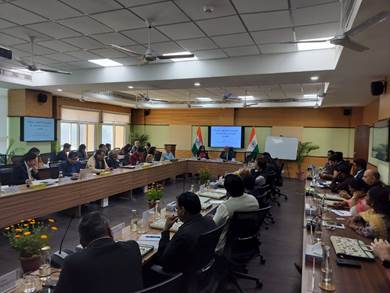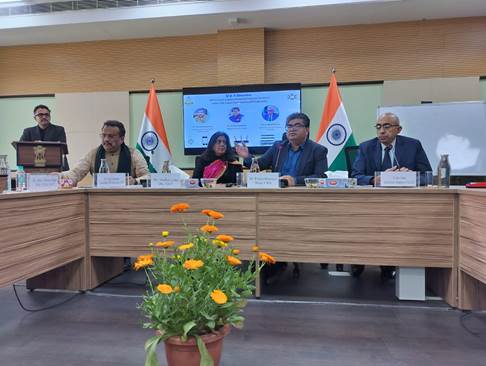The National Institute of Communication Finance (NICF) and the Centre for WTO Studies (CWS) orchestrated a pivotal two-day training program, convening a diverse tapestry of stakeholders to navigate the intricate realms of World Trade Organization (WTO) issues and their impact on the burgeoning Indian electronics and telecom sector. This collaborative effort aimed to bridge the knowledge gap and cultivate expertise in this dynamic domain, ultimately empowering India to chart a brighter course on the global trade stage.
 The workshop resonated with the vibrant exchange of ideas between leading experts, industry representatives, and policy shapers. Renowned figures like Shri Manish Sinha, Member (Finance) of the Department of Telecommunications, and Shri Bipin Menon, Development Commissioner of Noida SEZ, set the stage by emphasizing the urgent need to bolster India’s negotiating prowess and articulate its interests effectively at the WTO. This resonated deeply with participants, particularly from private sector entities like Tejas Network Limited and industry associations like MAIT, who underscored the necessity for such inclusive platforms to foster constructive dialogue.
The workshop resonated with the vibrant exchange of ideas between leading experts, industry representatives, and policy shapers. Renowned figures like Shri Manish Sinha, Member (Finance) of the Department of Telecommunications, and Shri Bipin Menon, Development Commissioner of Noida SEZ, set the stage by emphasizing the urgent need to bolster India’s negotiating prowess and articulate its interests effectively at the WTO. This resonated deeply with participants, particularly from private sector entities like Tejas Network Limited and industry associations like MAIT, who underscored the necessity for such inclusive platforms to foster constructive dialogue.
Eminent experts meticulously unpacked the complexities of international trade impacting the electronics and telecom space. Prof. Murali Kallummal unravelled the intricacies of WTO agreements, shedding light on India’s experiences with the Information Technology Agreement (ITA-1) and its expansion (ITA-E). Dr Pritam Banerjee, with his nuanced understanding of the global electronics industry, illuminated emerging trends and their potential implications for India’s growth trajectory. Meanwhile, Ms. Shailja Singh shed light on the often-opaque WTO dispute settlement system, empowering participants to navigate its processes and procedures with greater confidence.
The program delved into practical aspects of policy implementation and industry growth. Shri Bipin Menon, drawing on his vast experience, shared insights on India’s tariff treatment for electronic goods and led a session aimed at scaling up electronics manufacturing in India. This resonated with industry leaders, who called for continued collaboration between policymakers, industry representatives, and academicians to create an environment conducive to ease of doing business. The program culminated in a thought-provoking panel discussion featuring Mr Menon, Dr Banerjee, and Prof. Kallummal, where they offered their perspectives on the global and Indian electronics landscape, sparking further dialogue and prompting insightful questions from the audience.
The initiative resonated deeply with all participants, fostering a shared understanding of the challenges and opportunities that lie ahead. Industry associations like TEMA and USISPF echoed the need for more such platforms, emphasizing the importance of bringing together diverse stakeholders for knowledge exchange and collaborative problem-solving. The program served as a springboard for continued engagement, paving the way for a knowledge-driven ecosystem that empowers India to navigate the complexities of the global trade landscape and carve its path to success in the electronics and telecom sectors




